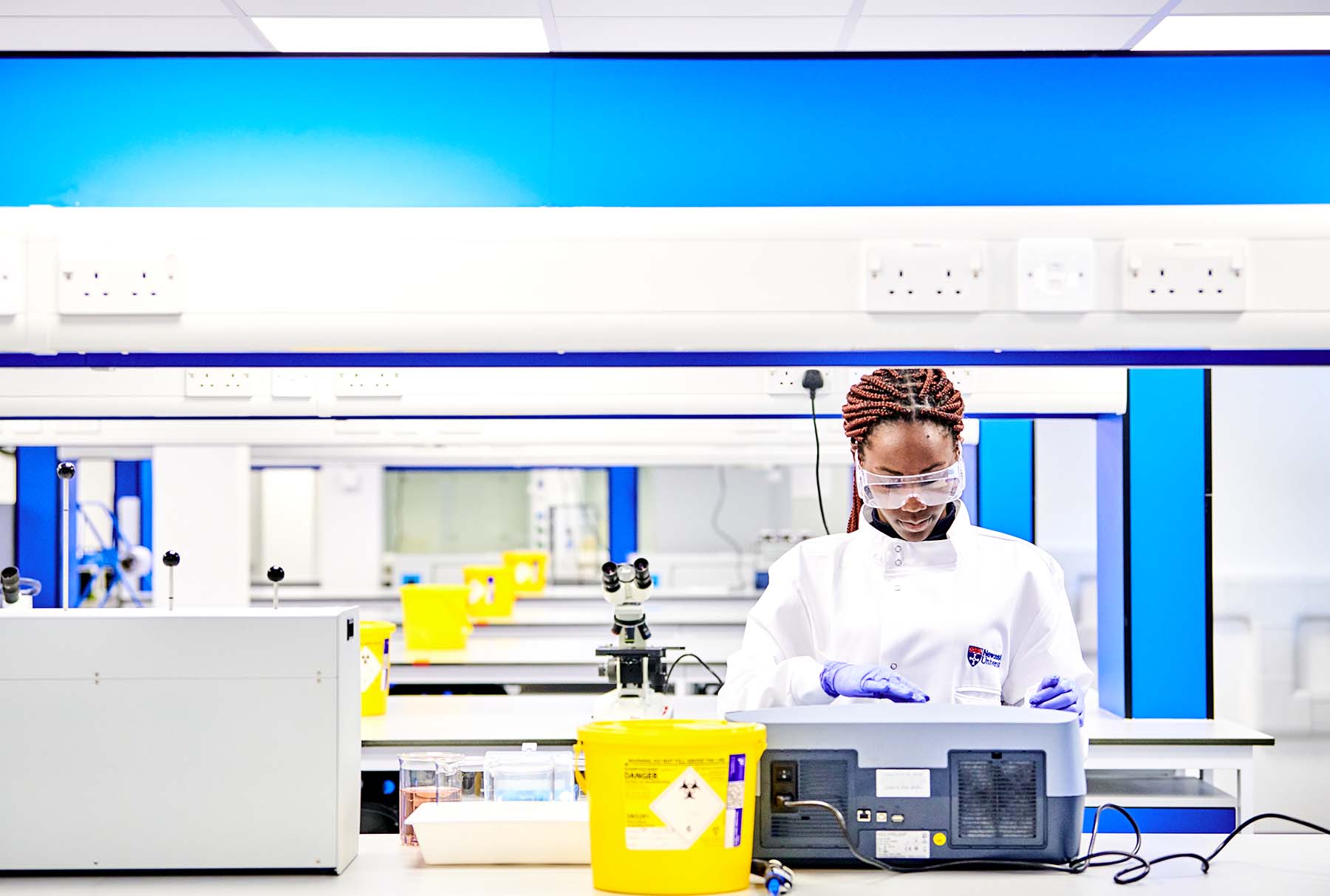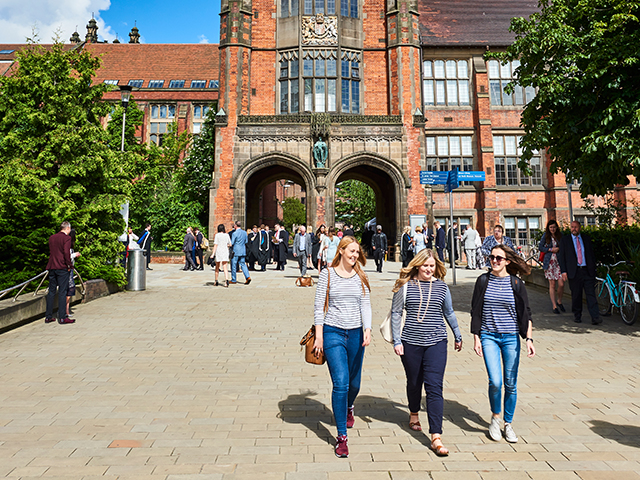Engineering International Year One
Engineering shapes the future all around us. Here in Newcastle is where great innovators developed ideas that changed the world. Start your journey to become part of our next generation of world-leading engineers
Course overview
Interested in progressing to Year 2 of an Engineering undergraduate degree at Newcastle University?
Engineers are needed across all sectors, making a degree in engineering a smart career choice. From developing surgical robots to making greener, safer transport or designing the cities of the future, you’ll be using your creativity and problem-solving skills to help shape the world we live in.
This course is suitable for you if you:
- need to improve your English language study skills within the context of engineering
- want guaranteed conditional progression to Year 2 of a degree at Newcastle University’s School of Engineering
- want to build your subject knowledge and English skills through modules taught by Newcastle University International Study Centre
- want access to specialised equipment within labs at Newcastle University International Study Centre and the School of Engineering
Progression
This course leads to the second year of the following undergraduate degrees at Newcastle University:
Highlights of this degree
Engineering shapes the future all around us. Here in Newcastle is where great innovators such as Armstrong, Stephenson, Merz and Swan developed ideas that changed the world.
Be part of our next generation of world-leading engineers and help address global challenges such as:
- climate change
- sustainable energy
- transport
- clean water supply
- waste management
Quality and ranking
Subject-based rankings
- 12th in the UK – The Guardian University Guide 2025 (Civil Engineering category)
- 16th in the UK – Sunday Times Good University Guide 2025 (Chemical Engineering category)
- Top 145 for Engineering and Technology - QS World University Rankings by Subject 2025
- Top 150 for Engineering - Chemical - QS World University Rankings by Subject 2025
- Top 150 for Engineering - Civil and Structural - QS World University Rankings by Subject 2025
- Top 200 for Engineering - Electrical and Electronic - QS World University Rankings by Subject 2025
- Top 250 for Engineering - Mechanical, Aeronautical and Manufacturing - Mechanical - QS World University Rankings by Subject 2025
University-wide rankings
- Global Top 140 University - QS World University Rankings 2026
- 65% increase in research power since 2014 – Research Excellence Framework 2021
- 42% of our research is classified as 4* world-leading research – Research Excellence Framework 2021
- Global Top 170 University - Times Higher Education World University Rankings 2024
Facilities
Our purpose built Newcastle University International Study Centre will provide you with everything you need to study with us.
Find out more about our facilities.
The Stephenson Building: engineering for the future
The Stephenson Building has been the driving force of engineering at Newcastle University for 70 years. We’re investing £100m to provide our students with a world-class engineering facility. You’ll study in an environment where engineers from all disciplines learn together and where research and innovation sit alongside your teaching.
Find out more about the Stephenson Building.
Specialist facilities at Newcastle University
Civil Engineering:
- BE:WISE: Europe’s largest wastewater treatment research facility
- Urban Observatory, collecting real-time urban data
- Geotechnical Soils Lab
- Heavy Structures Lab
Electrical and Electronic Engineering:
- Electrical Power Teaching Lab
- Merz Court Pilot Plant Laboratory
- Millennium Laboratory
- Lucas-Nuelle test rigs
- Clean-Room Microfabrication Lab
Mechanical Engineering:
- Dedicated biomaterial and biotribology labs
- Micro-electromechanical systems
- 3D motion capture
- Artificial joint testing
- Gear manufacture and testing
Core modules
- English for Academic Purposes
- Engineering Mathematics
- Sustainable Design, Creativity and Professionalism
- Electrical and Magnetic Systems
- Electronics and Sensors
- Thermofluid Mechanics
- Engineering Materials
- Mechanics
- Integrated Language Skills (Term 1)
- Engagement and Communicative Language Skills (Term 1)
- Teacher Supported Online Language Development (Term 1)
- Research and Study Skills (Term 1)
Teaching and assessment
Teaching
Class hours: 21 hours per week minimum
Class sizes: Average of 20 students per class for English language teaching
Age requirement: 17 years and above
Assessment
Entry to all honours degrees at Newcastle University is highly competitive, and students hoping to progress to Newcastle must maintain high standards throughout their course.
Whilst your grades in the Year One course do not count towards the final degree, your performance will be used to determine whether you meet the specified progression grades for direct entry to your chosen degree at the University. Assessment is both formal and informal.
Informally you will be given advice and feedback throughout your course from your teachers, enabling you to build on your successes and meet the requirements for entry to the second year of a degree. You will also be assessed via a combination of examinations at the end of each semester and coursework including:
- written assignments
- reports
- practical exercises
- group and individual research projects
- bibliographical searches
- oral and video presentations
- problem-solving exercises
Careers and employability
Be part of our next generation of world-leading engineers and help address global challenges such as:
- climate change
- sustainable energy
- transport
- clean water supply
- waste management
Your Engineering career begins here and some of your future career options could be:
- a Civil Engineer, using the latest technology to design, build and shape the world around us. This includes natural environments, buildings and infrastructures
- an Electrical Engineer, working in project teams with colleagues in other branches of engineering to design, build and test electrical systems and components
- a Mechanical Engineer, focusing on anything that moves – from prosthetic limbs and machinery to racing cars. You’ll design, develop and improve mechanical systems across a range of industries
Entry requirements
To study on this course you need to meet the following entry requirements.
All candidates are considered on an individual basis. If your qualifications are not listed here, please see our additional entry requirements web pages to find out which other qualifications are considered.
The entrance requirements below apply to 2024 entry.
English requirements
Three term: a minimum of IELTS 5.5 (with a minimum of 5.5 in writing) or equivalent
Four term: a minimum of IELTS 5.0 (with a minimum of 5.0 in writing) or equivalent
If you do not meet the minimum English language requirements you should apply for Academic English.
Additional fees
Enrolment fee: an extra charge of £250 per academic course, charged on confirmation
Text books: The cost of your text books varies depending on how many terms you study:
- £ 75.00 - £415.00
Lab fee: £500
Accommodation is not included in the fees. View your Newcastle University International Study Centre accommodation options.

